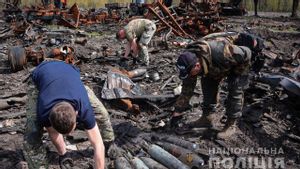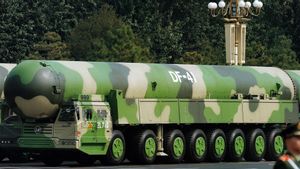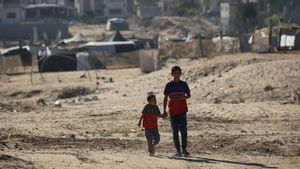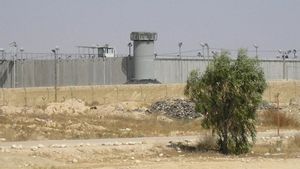JAKARTA - Russia committed a war crime by blocking the export of millions of tonnes of Ukrainian grain, the European Union's foreign policy chief said as the bloc's foreign ministers met Monday.
Ukraine is one of the top grain suppliers globally, but shipments have stalled and more than 20 million tonnes of grain have been trapped in silos since Russia invaded the country in February and then blocked its ports.
Russia denies responsibility for the food crisis, blaming Western sanctions imposed on Moscow for causing a spike in global food prices. Meanwhile, the United Nations warned of the risk of starvation in poor countries that rely heavily on imported grains.
The EU's foreign policy chief Josep Borrell called on Russia to open up an important Black Sea route to export larger quantities of Ukrainian grain.
"One cannot imagine that millions of tonnes of wheat remain blocked in Ukraine, while around the world people are suffering from hunger", he told reporters as he arrived for talks in Luxembourg, reported Reuters on June 20.
"This is a real war crime", said Borrell.
Before that, Russian Foreign Minister Sergei Lavrov said on June 8 that the onus was on Ukraine to resolve the issue of grain shipments, by reducing approaches to its Black Sea ports.
Furthermore, according to Foreign Minister Lavrov, Russia itself does not need to take action because it has made the necessary commitments.
The EU supports UN efforts to broker a deal to resume Ukraine's sea exports in exchange for facilitating Russian food and fertilizer exports, but that would require Moscow's green light.
Meanwhile, Germany and other countries are working to allow the transport of grain by road to 'release' at least part of the harvest when the new harvest begins, while some of the old harvests are still stored in Ukrainian silos.
To note, Kyiv broke the record grain harvest in net weight in 2021, reaching 84 million tonnes, up from the original 65 million tonnes in 2020.
SEE ALSO:
Meanwhile, this year, farmers have planted 14.2 million hectares of spring grain, down from 16.9 million hectares in 2021 due to the Russian invasion, according to Ukraine's Ministry of Agriculture.
Separately, German Foreign Minister Annalena Baerbock said Berlin was supporting Poland and Romania in adapting their rail lines to facilitate grain exports by land.
"What is clear is that in the end we certainly won't be able to get all the grain out. However, if we only manage to liberate some of it, on various routes, then this will help us face this global challenge", he said.
The English, Chinese, Japanese, Arabic, and French versions are automatically generated by the AI. So there may still be inaccuracies in translating, please always see Indonesian as our main language. (system supported by DigitalSiber.id)


















